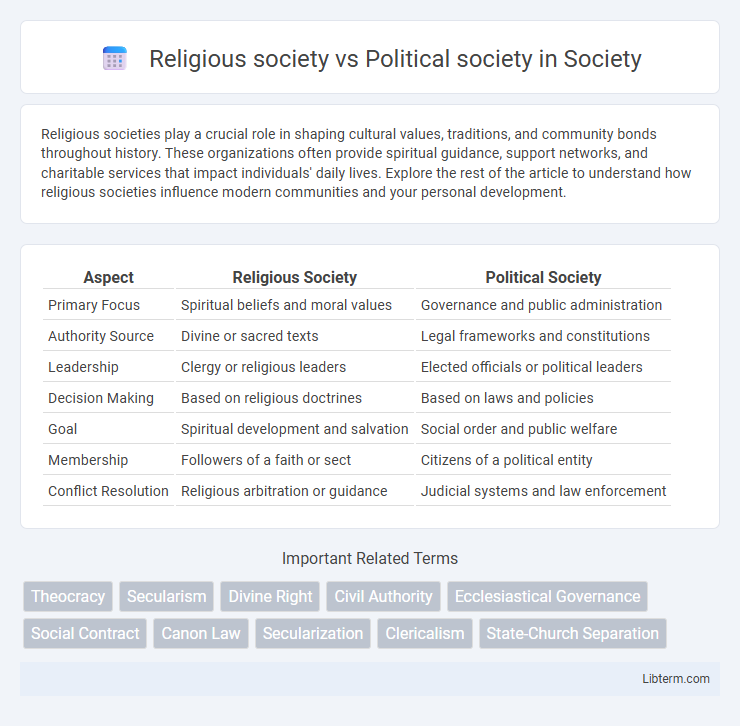Religious societies play a crucial role in shaping cultural values, traditions, and community bonds throughout history. These organizations often provide spiritual guidance, support networks, and charitable services that impact individuals' daily lives. Explore the rest of the article to understand how religious societies influence modern communities and your personal development.
Table of Comparison
| Aspect | Religious Society | Political Society |
|---|---|---|
| Primary Focus | Spiritual beliefs and moral values | Governance and public administration |
| Authority Source | Divine or sacred texts | Legal frameworks and constitutions |
| Leadership | Clergy or religious leaders | Elected officials or political leaders |
| Decision Making | Based on religious doctrines | Based on laws and policies |
| Goal | Spiritual development and salvation | Social order and public welfare |
| Membership | Followers of a faith or sect | Citizens of a political entity |
| Conflict Resolution | Religious arbitration or guidance | Judicial systems and law enforcement |
Defining Religious Society: Core Characteristics
Religious society is characterized by shared beliefs, rituals, and moral values centered around spirituality or divine authority, influencing social norms and individual behavior. It often features organized institutions, sacred texts, and communal worship that reinforce collective identity and ethical guidelines. The cohesion in a religious society stems from faith-based commitments rather than secular laws or political governance.
Understanding Political Society: Key Features
Political society is characterized by structured governance systems, including laws, institutions, and enforcement mechanisms that regulate public behavior and maintain order. It emphasizes sovereignty, the authority to make binding decisions over a defined territory, and the establishment of formal political institutions like governments, parliaments, and courts. Unlike religious society, which centers on shared beliefs and rituals, political society focuses on managing power, resources, and social relations through legal and administrative frameworks.
Historical Interplay Between Religion and Politics
The historical interplay between religious society and political society reveals a complex dynamic where religious institutions often shaped governance, laws, and cultural norms, as seen in theocratic regimes like ancient Egypt and medieval Europe. Political authority sometimes co-opted religious legitimacy to consolidate power, evident in the divine right of kings and the role of the Catholic Church in European monarchies. Conflicts and collaborations between these spheres have continuously influenced societal development, legal frameworks, and the balance of power throughout history.
Authority Structures: Clergy vs Government
Religious societies are governed by clergy who hold spiritual authority, often deriving power from sacred texts and traditions, shaping moral and ethical guidance within the community. Political societies operate under government institutions with authority vested in elected or appointed officials responsible for law enforcement, policy-making, and civil administration. The distinct legitimacy sources differentiate authority structures, where clergy maintain influence through religious doctrine, while government officials enforce secular laws and regulations.
Sources of Legitimacy and Power
Religious societies derive legitimacy and power primarily from divine authority, sacred texts, and spiritual leaders who claim moral and metaphysical guidance. Political societies base legitimacy on legal-rational frameworks, such as constitutions, laws, and institutionalized governance structures enforced through coercive mechanisms like police and military. The distinction highlights religious power grounded in belief systems and political power rooted in formalized authority and social contracts.
Law, Morality, and Social Norms
Religious society bases law and social norms primarily on divine commandments and moral codes derived from sacred texts, emphasizing spiritual obedience and ethical conduct as essential to communal harmony. Political society structures law through secular institutions, creating regulations and policies grounded in rational deliberation and collective governance, often separating legality from individual morality. The interplay between religion and politics shapes social norms differently: religious societies integrate morality deeply into law, while political societies may enforce laws independent of personal moral beliefs, promoting pluralism and social order.
Conflict and Cooperation: Case Studies
Religious societies often prioritize spiritual doctrines and moral codes, while political societies emphasize governance and legal frameworks, leading to conflicts over authority and social order. Case studies such as the role of the Catholic Church in medieval Europe reveal periods of both confrontation, like the Investiture Controversy, and cooperation, seen in church-state alliances supporting monarchies. In modern contexts, conflicts in the Middle East demonstrate tensions between religious movements and political regimes, whereas interfaith political coalitions illustrate potential for collaborative governance.
Secularization and Modernization Trends
Religious society, historically centered on spiritual authority and communal rituals, often experiences secularization as modernization trends promote rationalism, scientific inquiry, and individualism, leading to a decline in institutional religious influence. Political society, shaped by governance structures and legal frameworks, increasingly embraces secular principles to separate religion from state affairs, fostering pluralism and protecting civil liberties in modernizing contexts. The interplay between secularization and modernization drives a transformation where political societies adapt to diversity, while religious societies negotiate their role amid shifting social values and technological advancements.
Rights, Freedoms, and Social Order
Religious societies emphasize moral codes and communal obligations derived from sacred texts, often prioritizing collective rights and spiritual freedoms over individual autonomy. Political societies prioritize legal rights and civil freedoms, establishing governance systems that protect individual liberties and maintain social order through codified laws and institutions. Both systems aim to balance social order with rights, but religious societies often integrate ethical mandates with social cohesion, whereas political societies focus on secular governance and individual rights enforcement.
Future Perspectives: Bridging Religious and Political Societies
Future perspectives on bridging religious and political societies emphasize the integration of ethical frameworks from religious traditions with institutional governance to promote social cohesion. Emerging interdisciplinary approaches focus on dialogue-driven policy-making that respects pluralism while addressing societal challenges through values-based leadership. Technological advancements in communication and education facilitate mutual understanding, fostering collaborative efforts between religious communities and political institutions for sustainable development.
Religious society Infographic

 libterm.com
libterm.com